🧻 How Fast Do Bamboo Wet Wipes Break Down? A Closer Look at the “Slosh Test”
May 28, 2025
Recently, someone on TikTok asked exactly that—“How fast do bamboo wet wipes break down in the sewer system? Quick enough to not contribute to fatbergs?” We’re diving into the science behind that question, and why the materials used in your wet wipes matter more than you think.
🚿 The Slosh Test: How Scientists Test Wipe Breakdown
To evaluate how well a wipe breaks down, researchers use something called a “slosh test.”
It’s a simple but effective method:
-
A container filled with water (usually a bin or tank) is shaken.
-
A piece of toilet paper or wet wipe is added.
-
Scientists observe how long it takes to disintegrate and how small the fibers become.
You can even try a DIY version at home with a jar of water. Just drop in a bamboo wet wipe and shake for about 10 seconds—you’ll see it start breaking down into tiny plant-based fibers almost instantly.
🌱 Why Bamboo Wipes Break Down Faster
The secret lies in the materials. Bamboo wet wipes, like those made by Bim Bam Boo, are made from natural plant fibers such as bamboo, hemp, or cotton. These materials are:
-
Biodegradable
-
Non-toxic
-
Free from plastic fibers
In the slosh test, bamboo wipes break down quickly into soft, fibrous pieces that won’t clog pipes or contribute to sewer system blockages.

💀 What Are Fatbergs, and How Do Wet Wipes Cause Them?
Fatbergs are massive clumps of congealed fat, oil, grease, and non-biodegradable materials (like plastic-based wet wipes) that form in sewer systems.
Plastic-laden wipes—like baby wipes and disinfecting wipes—stay intact in water. Instead of breaking down, they collect fats and oils, creating massive obstructions that:
-
Block wastewater pipes
-
Damage municipal plumbing infrastructure
-
Require expensive, labor-intensive removal
In contrast, plant-based bamboo wet wipes disintegrate before they ever have the chance to contribute to these nasty sewer monsters.
⚠️ A Quick Word of Caution: Not All Pipes Are Created Equal
Even if you’re using biodegradable bamboo wet wipes, it’s important to know your plumbing.
If you’re not 100% confident that your system can handle any kind of wipe—even the flush-safe kind—DO NOT FLUSH. When in doubt, throw them in the trash.
Why?
Many older homes and buildings still rely on cast iron plumbing, which can develop rust buildup over time. These rough inner surfaces can catch even small, broken-down fibers, leading to slow drains or major blockages.
And if your property has large trees nearby, there’s also a risk of roots growing into the sewer line, which can cause backups—regardless of how biodegradable your wipes are.
So:
🧻 Use bamboo wipes for a better environmental impact.
🚫 But if your plumbing is older or unpredictable—don’t risk it. Trash 'em.
✅ The Bottom Line: Choose Wipes That Actually Break Down
Next time you shop for wet wipes, ask yourself:
-
Are they made with plant-based, biodegradable fibers?
-
Will they pass the slosh test?
-
Do they claim to be flushable—but contain plastics?
Bamboo wipes break down fast enough to avoid contributing to fatbergs, making them a safer, greener choice for your plumbing—and the planet.
Want to see the slosh test in action?
Check out our video demo and try it yourself at home with a jar, some water, and your current wipes. You might be surprised by the results.
